China’s New Silk Road: Weekly Arts & Culture Round Up – July 10, 2020
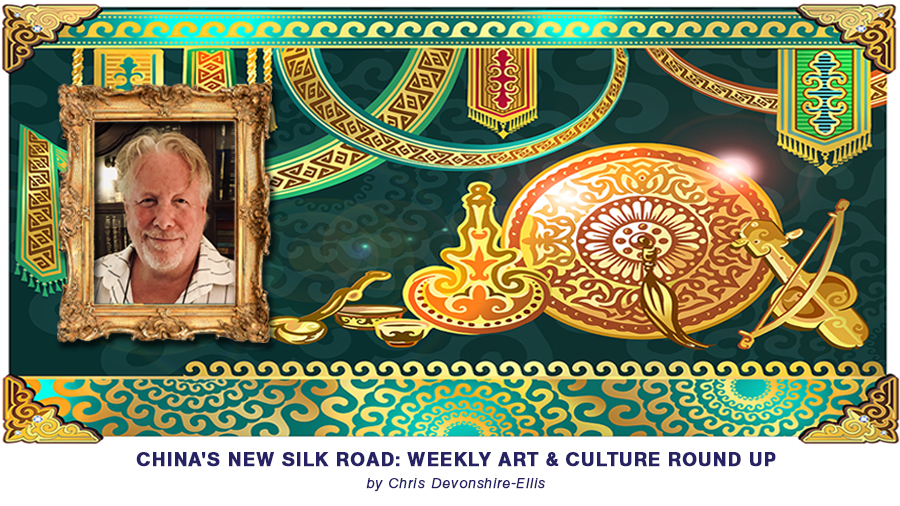
The Georgia Edition
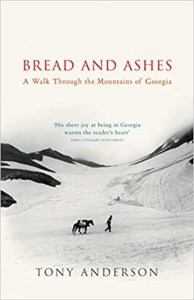 Bread & Ashes – A Walk Through The Mountains Of Georgia
Bread & Ashes – A Walk Through The Mountains Of Georgia
Tony Anderson set out in the summer of 1998 to walk through Georgia. He wanted particularly to visit the Georgian mountain tribes – Tush, Khevsurs, Ratchuelians and Svans – to discover if they shared a common mountain culture, and to test the old idea of the Caucasus as an impenetrable barrier from sea to sea. From Azerbaijan to Svaneti, Anderson found communities where the old customs and beliefs still triumphantly survive, despite years of Communist oppression and the terrible uncertainties since the collapse of the Soviet Union.
Throughout his journey Anderson refers back to many other visits to Georgia, to the politics of independence, to the war in Abkhazia and Ossetia, to the civil war and Shevardnadze’s accession to power, to the history of these people at one of the great crossroads of the world. It remains an abiding mystery that Georgia has managed to survive at all, devastated time and again by the vagabond hordes from the steppes and torn between the mighty empires that struggled over it. But survive it has with a vibrant culture still intact and, in the mountains, still deeply connected to its ancient ways.
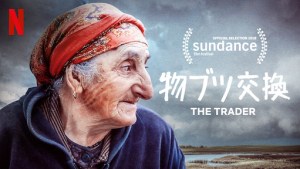 Georgian Sundance Film Winner – The Trader
Georgian Sundance Film Winner – The Trader
Potatoes, not lari, is the currency of rural Georgia, as ‘The Trader’, a hauntingly beautiful documentary, shows. For another view on Georgia, this is a must-watch. ‘The Trader’ (2018) is a soft-focus documentary with a hard edge. It follows Gela, a physically large wheeler-dealer as he tours provincial Georgia bartering with potato farmers. He wants to exchange cheap toys, scarves and handbags he buys in Tbilisi for their potatoes. No money ever changes hands in this haunting 23-minute production. And this documentary is as revealing as it is beautiful. The poverty, despair and economy of rural Georgia are laid bare, and they are gritty. A cast of characters flits across the screen, all drenched in poverty and broken dreams, realised or unrealised. An old potato farmer sucks on a rough cigarette as he discusses how, if he could start again, he would flee the countryside for Tbilisi, where he would drive around in a “BNW”. Instead, this old man returns to pulling up potatoes from his muddy field. A few minutes later an old woman begs Gela to reduce the cost of a cheese grater. Off-camera, he refuses. She turns away, her face despondent and crushed and resigned. Then there is the speechless little boy who seems utterly bewildered when he is asked what he wants to do when he grows up, as if any thought of escaping the potato farm is too outrageous to even consider. In the next scene, he and a friend pick through some of the items in Gela’s truck. They finger a packet of colourful sponges and a glittery handbag with awe. For analysts focused on Georgia, people who do business there and for anybody looking for a good insight into the region, ‘The Trader’ comes highly recommended. It shines an unflinching light on the underside of the Georgia story, an oft-forgotten one. The narrative for Georgia is of a westward looking country, modernising away from its former Soviet past towards its European future. ‘The Trader’ shows that, away from Tbilisi, there is another version of this narrative playing out.
The Trader won the Sundance Institute’s short film award, and is available on Netflix. A preview is below.
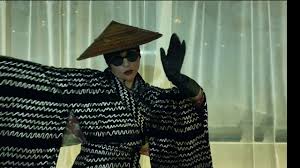 Georgi Jorjoliani – Empty City
Georgi Jorjoliani – Empty City
All of have been affected by the Coronavirus. Georgi Jorjoliani has created an ethereal and moving piece of music, video and dance filmed in the deserted empty street of Tbilisi. It’s beautiful and sums up the desolation, sadness and disconnect of a world under lockdown very well.
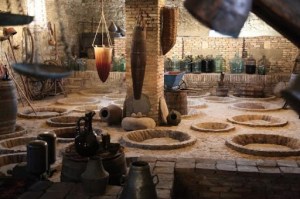 Here Lives Wine – The Story Of The Worlds Oldest Wine: Qvevri.
Here Lives Wine – The Story Of The Worlds Oldest Wine: Qvevri.
Qvevri wine-making is practised throughout Georgia, particularly in village communities where unique varieties of grapes are grown. The Qvevri is an egg-shaped earthenware vessel used for making, ageing and storing the wine. Knowledge and experience of Qvevri manufacture and wine-making are passed down by families, neighbours, friends and relatives, all of whom join in communal harvesting and wine-making activities. Children learn how to tend the vines, press grapes, ferment wine, collect clay and make and fire Qvevris through observing their elders. The wine-making process involves pressing the grapes and then pouring the juice, grape skins, stalks and pips into the Qvevri, which is sealed and buried in the ground so that the wine can ferment for five to six months before being drunk. Most farmers and city dwellers use this method of making wine. Wine plays a vital role in everyday life and in the celebration of secular and religious events and rituals. Wine cellars are still considered the holiest place in the family home. The tradition of Qvevri wine-making defines the lifestyle of local communities and forms an inseparable part of their cultural identity and inheritance, with wine and vines frequently evoked in Georgian oral traditions and songs.
 Chris’s Colonial Cocktails – The Tbilisi Fix
Chris’s Colonial Cocktails – The Tbilisi Fix
Chacha is a Georgian brandy. It is a strong liquor (40% until 60%). It is also called grape vodka or vine vodka. It is made from grape pomace but also other fruit and herbs are used in it (figs, oranges, tangerines, mull-berries). It is not a familiar ingredient in cocktails but this is a cocktail based on ChaCha. If you can’t find ChaCha, use an Italian Grappa.
- 00 cl ChaCha
- 50 cl Cherry Liqueur
- 00 cl Lemon Juice
- 00 teaspoon Sugar
Salut! Have a Great Weekend!
About Us
Silk Road Briefing is published by Dezan Shira & Associates. Chris Devonshire-Ellis is the practice Chairman. Please contact Chris at silkroad@dezshira.com or through his Linked In account, or visit the firm at www.dezshira.com





